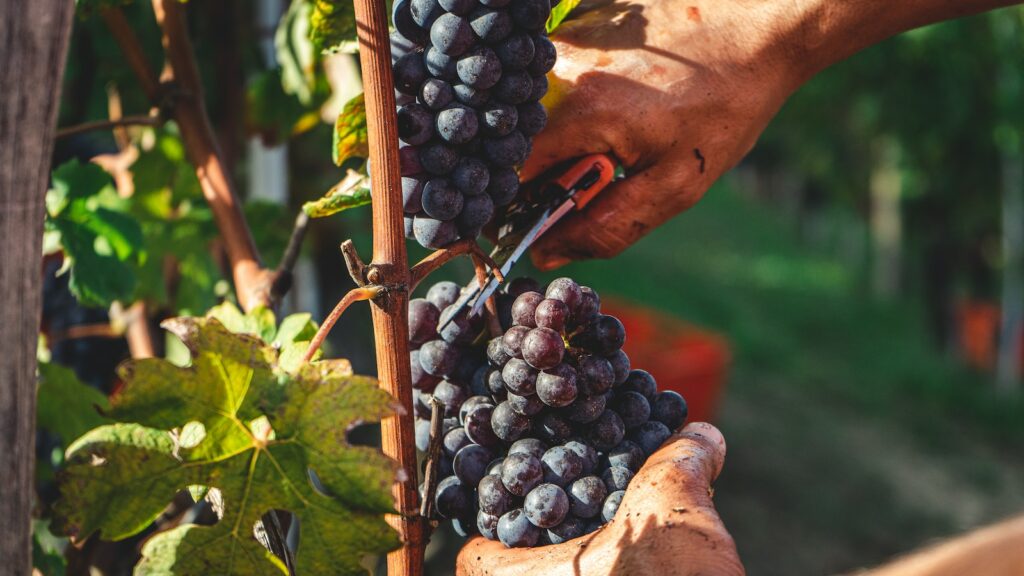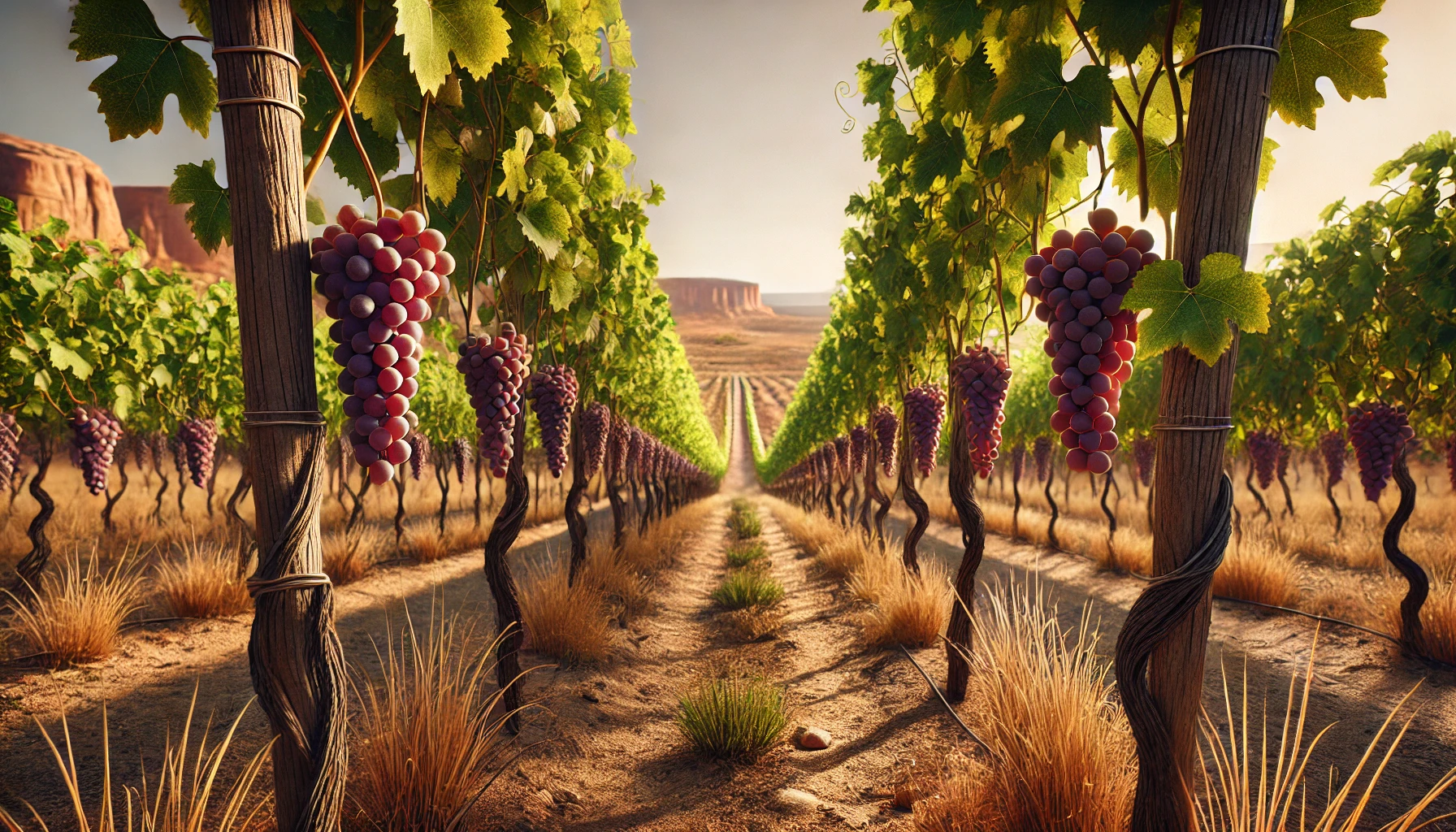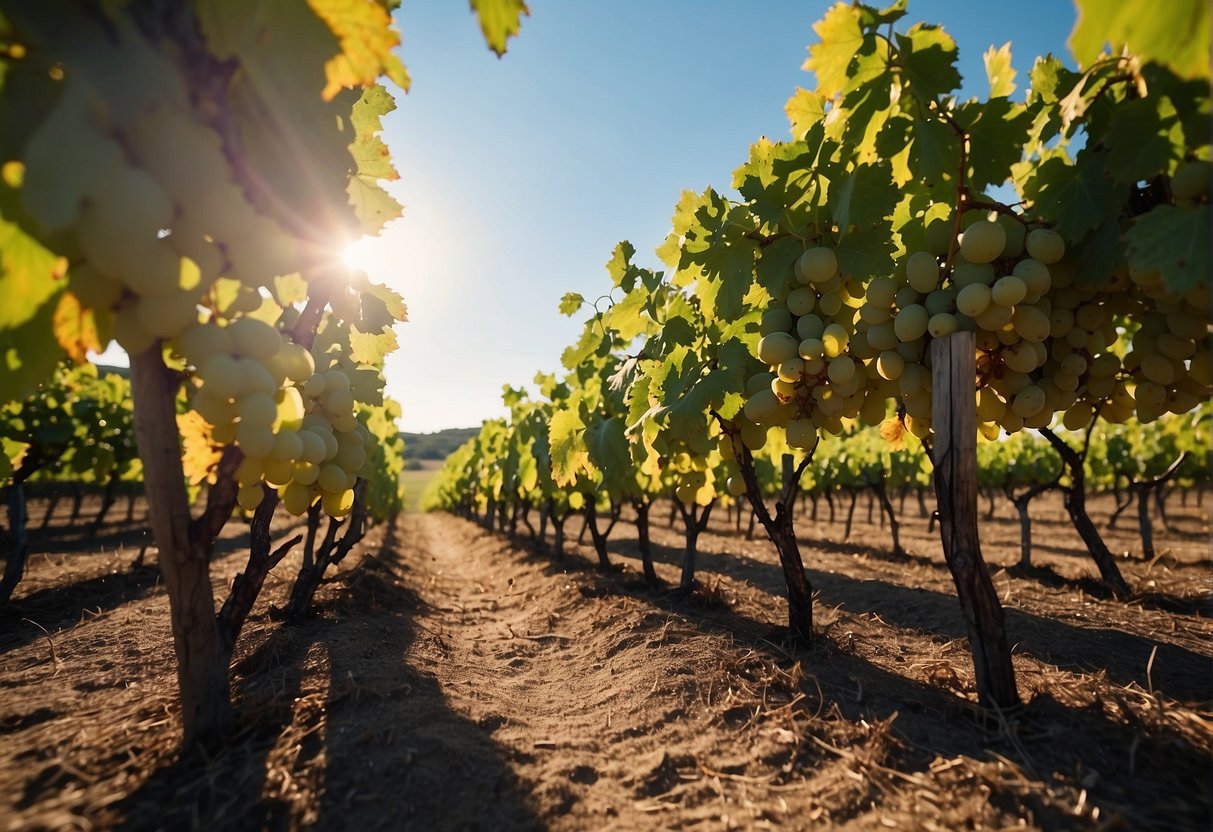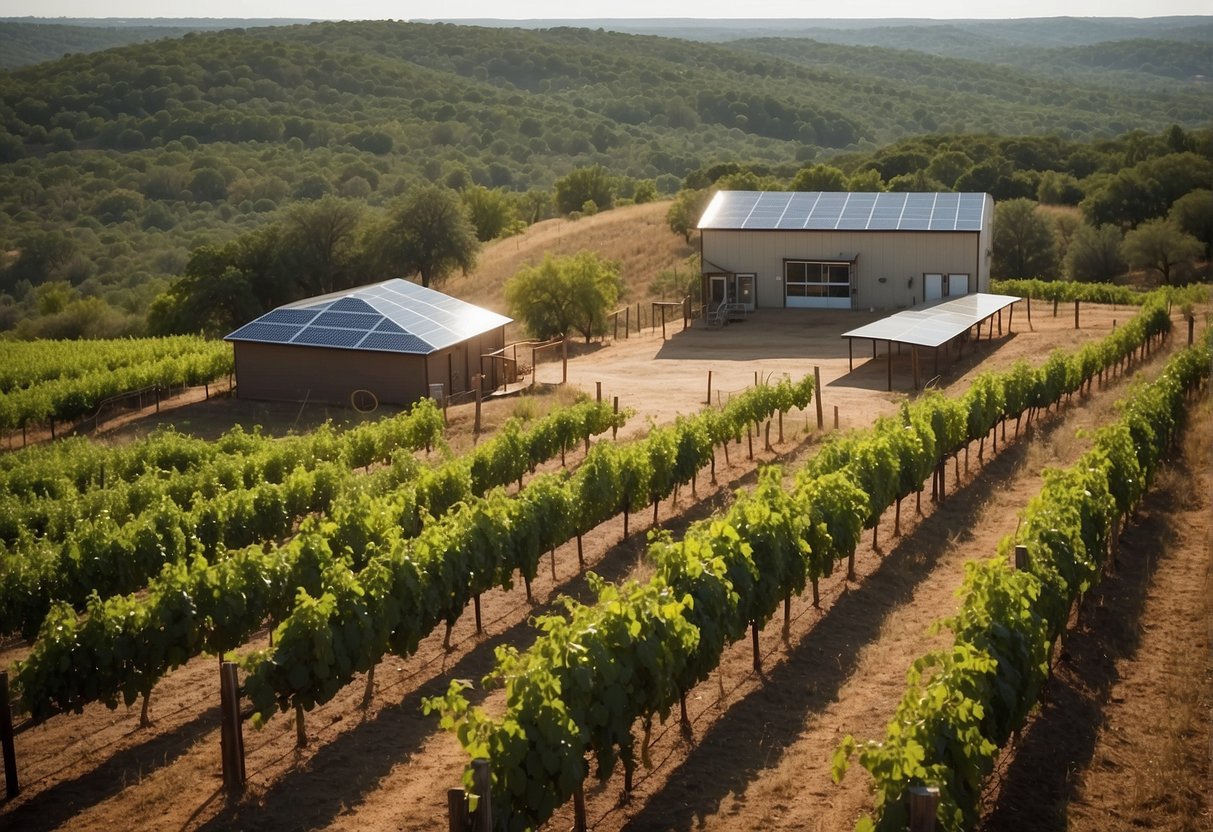
Sustainable viticulture practices have become increasingly important in the state of Texas as the wine industry continues to grow. Texas is now the fifth-largest wine-producing state in the country, with over 8,000 acres of vineyards across the state. As the industry expands, it is crucial to implement sustainable practices to minimize the environmental impact and ensure the longevity of the industry.
Texas A&M AgriLife is committed to strengthening the Texas grape and wine industry through sustainable practices. They accelerate research, prepare the future workforce, and educate both farmers and consumers alike on wine production and wine consumption. Their Viticulture and Sustainable Fruit Applied Research Program focuses on developing sustainable practices for fruit and grape production in Texas. The program covers topics such as crop management, pest control, and soil health, among others. By implementing these practices, farmers can reduce their environmental impact and increase their crop yield while maintaining the quality of their produce.
Understanding Sustainable Viticulture
Sustainable viticulture is a holistic approach to wine grape production that aims to minimize environmental impact while maintaining economic viability and social responsibility. It involves a set of practices that promote soil health, reduce the use of synthetic chemicals, and conserve natural resources.
Viticulture
Viticulture is the science and practice of growing grapes for wine production. It encompasses a wide range of disciplines, including plant biology, chemistry, microbiology, and ecology. Viticulturists are responsible for managing vineyards, selecting grape varieties, and optimizing grape quality and yield. Sustainable viticulture is a key area of focus for viticulturists, as it ensures the long-term health and productivity of vineyards.
Sustainable Practices
Sustainable viticulture involves a range of practices that promote environmental, economic, and social sustainability. These practices include:
- Integrated pest management (IPM): IPM is a method of pest control that uses a combination of biological, cultural, and chemical controls to manage pests and diseases. It reduces the need for synthetic pesticides and promotes the use of natural predators and beneficial insects.
- Cover cropping: Cover crops are planted between rows of grapevines to improve soil health, reduce erosion, and provide habitat for beneficial insects. They also help to reduce water use and nutrient runoff.
- Water conservation: Water is a precious resource in viticulture, and sustainable practices aim to reduce water use through efficient irrigation systems, soil moisture monitoring, and drought-tolerant grape varieties.
- Soil health: Sustainable viticulture promotes soil health through practices such as composting, crop rotation, and reduced tillage. Healthy soils are essential for grapevine growth and productivity.
Biology
The biology of grapevines is complex, and sustainable viticulture takes into account the interactions between grapevines and their environment. Grapevines are susceptible to a range of pests and diseases, and sustainable practices aim to minimize the use of synthetic pesticides and fungicides. Instead, they promote the use of natural predators and beneficial insects to control pests and diseases.
Natural Resources
Sustainable viticulture recognizes the importance of natural resources such as soil, water, and biodiversity. It aims to conserve these resources through practices such as cover cropping, water conservation, and habitat restoration. By conserving natural resources, sustainable viticulture ensures the long-term health and productivity of vineyards.
In summary, sustainable viticulture is a holistic approach to wine grape production that promotes environmental, economic, and social sustainability. It involves a range of practices that promote soil health, reduce the use of synthetic chemicals, and conserve natural resources. Viticulturists play a key role in sustainable viticulture, as they are responsible for managing vineyards and optimizing grape quality and yield.
Role of Texas A&M Agrilife in Sustainable Viticulture
Texas A&M Agrilife is committed to promoting and advancing sustainable viticulture practices in Texas. The organization plays a vital role in providing research, extension services, and educational programs to the grape and wine industry in Texas.
Research and Development
The Department of Horticultural Sciences at Texas A&M College of Agriculture and Life Sciences is actively involved in applied research on vineyards, insect and disease management, selection of grape varieties, wine processing, and wine quality. The research conducted by Texas A&M Agrilife is focused on developing sustainable and regenerative agriculture practices that can help improve the quality and quantity of grape production in Texas.
Extension Services
The Agrilife Extension Service of Texas A&M Agrilife provides outreach expertise and resources to growers and wine producers in Texas. The extension service offers educational programs that help farmers and producers adopt sustainable viticulture practices, manage resources, and improve grape production. The extension service also provides assistance in pest management, irrigation, and soil fertility management.
Educational Programs
Texas A&M Agrilife offers educational programs that prepare the future workforce and educate both farmers and consumers on wine production and consumption. The Viticulture and Enology program educates growers and wine producers through applied research on vineyards, insect and disease management, selection of grape varieties, wine processing, and wine quality. The program also provides training on sustainable viticulture practices and management of resources.
In conclusion, Texas A&M Agrilife plays a critical role in promoting sustainable viticulture practices in Texas. The organization’s research and development, extension services, and educational programs help improve the quality and quantity of grape production in Texas while preserving the environment.
The Texas Wine Industry
The Texas wine industry has a long history dating back to the 17th century when the first grape vines were planted by Spanish missionaries. However, the commercial industry remained dormant until recently. As of 2023, Texas is home to over 500 wineries and 350 vineyards, with over 5,000 acres of wine grape production.
Wine Production
Committed to strengthening the Texas grape and wine industry through sustainable practices, Texas A&M AgriLife accelerates research, prepares the future workforce, and educates both farmers and consumers alike on wine production and wine consumption. The state’s wine production is mainly centered in the Hill Country and High Plains regions, with the most commonly grown grape varieties being Cabernet Sauvignon, Tempranillo, and Chardonnay.
Economic Impact
The Texas wine industry has a significant economic impact on the state, contributing over $13 billion to the Texas economy annually. The industry provides employment opportunities for thousands of Texans and attracts millions of visitors to the state each year. With the increasing demand for Texas wines, the industry is expected to continue to grow and contribute to the state’s economy.
Future Workforce
The future of the Texas wine industry depends on the development of a skilled workforce. Texas A&M AgriLife offers programs and courses to prepare students for careers in the wine industry, including viticulture, enology, and wine business management. As the industry continues to grow, there will be a need for skilled workers to meet the demand for Texas wines.
In conclusion, the Texas wine industry is an important part of the state’s economy, with a rich history and a promising future. With the support of sustainable practices, research, and education, the industry will continue to thrive and contribute to the state’s economic growth.
Viticulture and Enology in Texas
Texas is the fifth leading wine-producing state in the United States, and the wine industry is a significant contributor to the state’s economy. The state’s warm climate and diverse soil types make it an ideal location for grape growing, and the Texas wine industry has been growing rapidly in recent years.
Vineyard Management
Vineyard management is a crucial aspect of sustainable viticulture in Texas. Grape growers in Texas use a variety of sustainable practices to manage their vineyards, including cover cropping, integrated pest management, and water conservation. Cover cropping is a common practice in Texas vineyards, where crops like clover and rye are grown between rows of grapevines to prevent soil erosion and improve soil quality.
Integrated pest management is another sustainable vineyard management practice used by grape growers in Texas. This approach involves using a combination of techniques to control pests, including natural predators, pheromone traps, and insecticides. Grape growers in Texas also use water conservation techniques like drip irrigation and rainwater harvesting to reduce water usage in their vineyards.
Grape Varieties
Texas is home to a wide variety of grape varieties, including both native and hybrid grapes. Some of the most popular grape varieties in Texas include Cabernet Sauvignon, Chardonnay, and Merlot. Texas also has several unique grape varieties that are well-suited to the state’s warm climate, including Blanc du Bois and Black Spanish.
Enology Practices
Enology, or the science of winemaking, is an essential aspect of sustainable viticulture in Texas. Grape growers in Texas use a variety of enology practices to produce high-quality wines, including controlling acidity levels, preventing cork taint and haloanisole taint, and using fining agents to clarify wine.
Controlling acidity levels is a critical aspect of winemaking in Texas, where the warm climate can lead to high acid levels in grapes. Grape growers in Texas use a variety of techniques to control acidity levels, including adjusting the pH of the wine and using malolactic fermentation to convert malic acid to lactic acid.
Preventing cork taint and haloanisole taint is another essential aspect of sustainable winemaking in Texas. Grape growers in Texas use a variety of techniques to prevent these taints, including using alternative closures like screw caps and synthetic corks.
Finally, using fining agents to clarify wine is a common practice in Texas winemaking. Fining agents like bentonite and egg whites are used to remove impurities from the wine, resulting in a clearer, more stable product.
Overall, sustainable viticulture and enology practices are essential to the success of the grape and wine industry in Texas. Grape growers and winemakers in Texas are committed to using sustainable practices to produce high-quality wines that are both delicious and environmentally friendly.
Challenges and Solutions in Sustainable Viticulture
Biotic and Abiotic Problems
Sustainable viticulture faces challenges from both biotic and abiotic factors. Biotic problems refer to issues caused by living organisms, such as pests, diseases, and weeds, while abiotic problems refer to non-living factors, such as weather, soil, and water quality.
To address biotic problems, farmers and growers can use integrated pest management (IPM) techniques that minimize the use of synthetic pesticides and herbicides. This includes using natural predators, crop rotation, and resistant varieties of grapes. For abiotic problems, farmers can use precision irrigation techniques that optimize water use and reduce water waste. They can also use cover crops to improve soil quality and reduce soil erosion.
Waste Reduction and Management
Waste reduction and management is another challenge facing sustainable viticulture. Grape pomace, the solid remains of grapes after pressing, is a significant waste product that can be challenging to dispose of sustainably. However, it can be repurposed for animal feed, fertilizer, or even as a source of biofuel.
Another waste reduction technique is to use equipment that minimizes waste during grape harvesting. For example, machines that shake the vines to remove the grapes can cause significant damage to the fruit, leading to waste. By using gentler equipment, such as hand pruning and harvesting, farmers can reduce waste and improve grape quality.
Crop Thinning and Management
Crop thinning and management is essential for sustainable viticulture. Overcrowding of grapes on the vine can lead to lower quality fruit and increased susceptibility to pests and diseases. By thinning the crop, farmers can improve grape quality and yield.
Land management is also crucial for sustainable viticulture. Farmers can use techniques such as cover cropping, reduced tillage, and composting to improve soil health and reduce soil erosion. Additionally, by using sustainable land management practices, farmers can reduce their carbon footprint and contribute to a healthier environment.
In conclusion, sustainable viticulture faces several challenges, including biotic and abiotic problems, waste reduction and management, and crop thinning and management. By implementing sustainable practices such as IPM, precision irrigation, and gentle harvesting equipment, farmers can address these challenges and contribute to a more sustainable and environmentally friendly grape growing industry in Texas.
Community Involvement and Education
Sustainable viticulture benefits not only the environment but also the community. It is important to educate and involve the community in sustainable viticulture practices to promote a healthy and sustainable ecosystem. Here are some ways that the community can get involved and learn more about sustainable viticulture in Texas.
Texas Master Gardener Program
The Texas Master Gardener Program is a volunteer program that provides education and outreach to the community about gardening, horticulture, and the environment. The program offers various training opportunities for volunteers to become certified Master Gardeners. The volunteers then use their knowledge to educate the community about sustainable gardening practices, including sustainable viticulture.
Online Courses
The Learn, Grow, Eat & Go! Online Course is a free online course offered by the Texas A&M AgriLife Extension Service. The course provides education on gardening, nutrition, and cooking. It includes a section on sustainable viticulture, which covers topics such as soil health, pest management, and water conservation.
Webinars
The Texas A&M AgriLife Extension Service offers webinars on various topics related to agriculture, including sustainable viticulture. These webinars provide an opportunity for growers and volunteers to learn about the latest research and best practices in sustainable viticulture. The webinars are also a great way to network and connect with other growers and professionals in the industry.
In conclusion, community involvement and education are crucial for promoting sustainable viticulture in Texas. The Texas Master Gardener Program, online courses, and webinars are just a few ways that the community can get involved and learn more about sustainable viticulture. By working together, we can create a healthier and more sustainable ecosystem for future generations.
Sustainable Viticulture in Different Regions of Texas
West Texas
West Texas is known for its dry and hot climate, which can make viticulture challenging. However, some vineyards in this region have found ways to implement sustainable practices. For example, the Escondido Valley appellation in Pecos County has implemented drip irrigation systems to conserve water and reduce water waste. Additionally, some vineyards in this region have implemented cover crops to improve soil health and reduce erosion.
High Plains
The High Plains region of Texas is known for its high elevation and cool nights, which can be beneficial for grape production. However, this region also experiences high winds and hailstorms, which can damage grapevines. To mitigate these risks, some vineyards in this region have implemented hail netting to protect the vines. Additionally, some vineyards have implemented integrated pest management practices to reduce the use of pesticides and herbicides.
Lubbock
Lubbock is home to the Texas Tech University Viticulture and Enology Program, which has been instrumental in promoting sustainable viticulture practices in the region. For example, Daniel Hillin, a viticulture specialist at Texas Tech, has conducted research on sustainable irrigation practices in the region. Additionally, Jacy Lewis, a laboratory manager at the Viticulture and Fruit Lab in Fredericksburg, has conducted research on sustainable wine production practices.
Overall, sustainable viticulture practices are becoming increasingly important in Texas as the wine industry continues to grow. By implementing sustainable practices, vineyards in different regions of Texas can reduce their environmental impact and improve the quality of their grapes.
Conclusion
In conclusion, sustainable viticulture practices are crucial for the Texas wine industry to continue thriving while minimizing negative environmental impacts. As the demand for quality wine continues to grow across the U.S., it is important for fruit production and fruit growers to implement sustainable practices to ensure a consistent supply of high-quality grapes.
Through the use of cover crops, integrated pest management, and efficient irrigation systems, vineyards can reduce their environmental footprint while improving the quality of their grapes. Additionally, the use of compost and other organic fertilizers can improve soil health and reduce the need for synthetic fertilizers.
Overall, the adoption of sustainable viticulture practices in Texas is a win-win for both the environment and the wine industry. By implementing these practices, vineyard owners can reduce their costs and improve their yields, while also contributing to a healthier and more sustainable future for all.



